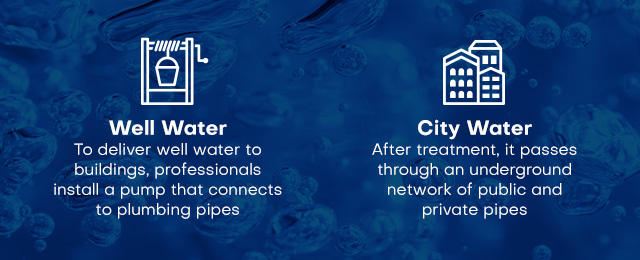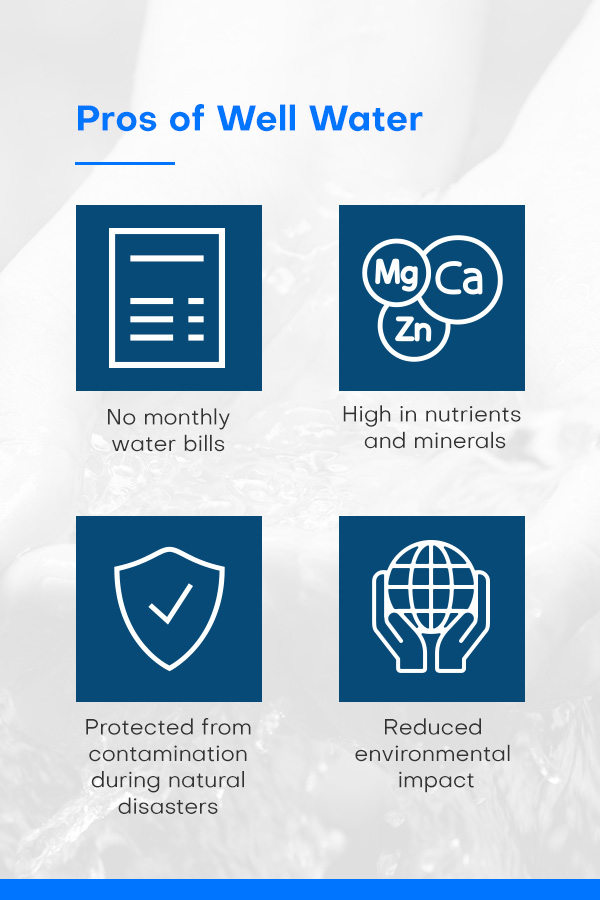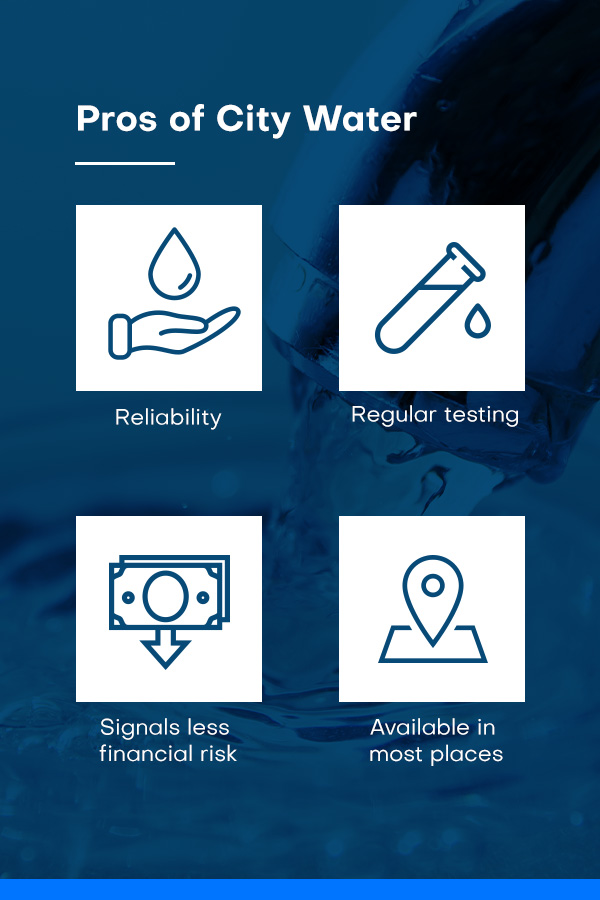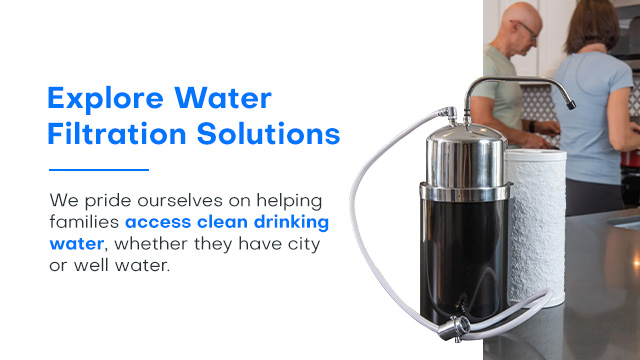Well Water vs. City Water: Pros and Cons
Jun 12th 2024
In the United States, 9 out of 10 people get their water from municipalities, while 13 million households access drinking water from private wells. Both water sources can provide specific advantages for homeowners, depending on their property, budget, and other unique factors.
City and well water differ in many ways, and you may wonder whether you're drinking and using the cleanest water available. Prioritizing safe drinking water is key to keeping you and your family from consuming contaminated water that can lead to health-related consequences.
In our guide, we discuss the pros and cons of well water vs. city water, how you can make an informed decision about the type of water you choose, and why filtration is a must for any water source.
View Our Drinking Water Systems
Similarities and Differences of Well Water vs. City Water
Well water and city water have many similarities and differences in regard to source, delivery, treatment, testing, cost, and quality.
Source
Well water comes straight from underground aquifers, while city water comes from surface and groundwater.
- Well water: To access well water, a hole is drilled in the ground to reach an aquifer. Aquifers are water-bearing rocks that transmit water by way of wells and springs. Rain and surface water replenish the porous rock of the aquifer which then can be pumped directly into a home through its plumbing connection.
- City water: By comparison, many city water systems are supplied by surface or groundwater, while large cities get their water from a mix of the two. Groundwater is accessed through a spring or well before pumping into a treatment center before reaching homes. Freshwater is collected from lakes, rivers, or reservoirs then treated and supplied by a series of pipes.
Delivery
Delivery methods also differ between city and well water. City water can travel hundreds of miles through pipes to your faucet, while well water generally travels a much shorter distance.
- Well water: To deliver well water to buildings, professionals install a pump that connects to plumbing pipes. Powered by a motor, the pump pulls the water from the aquifer and distributes it to the plumbing system to reach the home.
- City water: As mentioned, cities obtain water through surface or groundwater. After treatment, it passes through an underground network of public and private pipes. City water has a farther distance to travel before reaching homes, so it can be subject to contamination along the way.
Treatment
City and well water undergo different treatment processes:
- Well water: If necessary, homeowners are responsible for personally treating their well water with a variety of technologies. Untreated well water can contain various types of toxic substances, including lead or bacteria, making filtration an essential part of well ownership.
- City water: City water is treated by the municipality with a disinfectant, such as chlorine chloramine. Specific chemicals are meant to treat the water and reduce pathogens before the water reaches consumers. However, city water can be exposed to contaminants after treatment, as it often travels many miles before reaching homes.
Testing
The testing processes for well vs. city water include:
- Well water: In most areas, wells must have rudimentary testing upon the sale of the property. Other than that, it is up to the homeowner to have their water tested annually and ensure it is safe to drink. If you have well water, you might arrange for testing through a state-certified water testing laboratory.
- City water: Municipalities are required by the federal government to routinely test for certain contaminants in water and publish their findings annually. They will notify residents of a significant microbiological outbreak or if there are other contaminants present. The Environmental Protection Agency (EPA) sets drinking water regulations for over 90 contaminantsand requires all water systems to provide an annual water quality report to all residents.
Cost
Differences in city water vs. well water costs include:
- Well water: The cost of well water is determined by the initial cost of drilling. It also depends on the maintenance of the well and pump as well as the electricity used to pump the water. The homeowner is responsible for maintenance costs, equipment repairs, and necessary treatments.
- City water: Municipal water has a cost. You pay the municipality for the amount of water you use, plus taxes and fees. These rates tend to change over time. City water is typically charged by the gallon, and municipalities can limit or shut off water access when regulations or specific events call for it.
Quality
In terms of quality, city and well water differs in the following ways:
- Well water: Well water quality is not regulated under federal law, but it should still meet basic quality standards. While its quality can sometimes be higher than city tap water, there are instances where it can also be worse. Well water is prone to high iron and high manganese, and its quality is greatly influenced by local geological, agricultural, and industrial contaminants.
- City water: The EPA's Safe Drinking Water Act requires city water to meet specific quality standards. These regulations are the same across the country, setting maximum contaminant levels and treatment requirements. City water quality must be monitored by states, local authorities, and water suppliers.
View Our Drinking Water Systems
Pros and Cons of Well Water vs. City Water
Whether you get your water from your local city or an underground well, each source comes with its own advantages and considerations. To understand the differences, here are the pros and cons of city and well water:
Pros of Well Water
Well water comes with advantages like:

- No monthly water bills: Aside from the costs of installing a well, well water tends to be more affordable than city water. You won't have monthly water bills, and if you use your own septic system, you don't have to worry about a septic bill, either.
- High in nutrients and minerals: Well water typically contains minerals and nutrients without the chemicals and other contaminants that can be found in city water. An underground aquifer typically offers cleaner water compared to runoff or surface water, high in healthy nutrients and minerals that benefit the body.
- Protected from contamination during natural disasters: Well water can be protected from high risks of contamination during a natural disaster — a properly sealed well connected to a backflow prevention device may not be contaminated in the event of a flood or other weather scenario. In comparison, these events can disrupt a municipality's ability to distribute safe water, damaging or completely interrupting the water supply.
- Reduced environmental impact: Private wells may use fewer chemicals during the treatment process, protecting the surrounding ecosystem from runoff. This aspect helps lessen the strain placed on the environment compared to industrialized water plants.
Cons of Well Water
Some downsides and considerations of well water include:
- Dependent on electricity: Well water delivery depends on an electrical pump. If the electricity goes out, there is no water access. As a result, it's important for well water users to have an alternative power source, such as a generator, to ensure they can still use water when their main source of power goes out.
- The homeowner is responsible for quality and quantity: If a well experiences an issue where it runs dry, the homeowner is responsible for maintenance, repairs, or additional drilling as needed. Additionally, the homeowner must have their well water tested regularly, ensuring it is safe to use. It's not uncommon to have contaminants in well water, so filtration and treatment systems are necessary. Additionally, natural minerals can stain sinks, showers, and toilets while also impacting plumbing fixtures if left unaddressed.
- Potential contamination: Well water can be contaminated by chemicals, fertilizer, animal manure, detergent, sewage, and runoff from farms. These pollutants can impact the quality of well water and increase the risk of long-term diseases if high levels of contaminated water are consumed for many years.
View Our Drinking Water Systems
Pros of City Water
Advantages of city water include:

- Reliability: Municipal water is often more dependable, as it is the city's responsibility to ensure its quality and quantity. Your municipality will respond to widespread issues and restore access when needed. You'll have less maintenance to worry about, and you can have peace of mind you'll be able to access water when needed.
- Regular testing: City water must meet or exceed EPA quality guidelines. Homeowners can receive water testing results once a year, and many can request free water tests at any time. City water also uses chlorine or chloramine to treat disease-causing germs like norovirus and Salmonella. You will be notified if water becomes unsafe to drink.
- Signals less financial risk: Some home experts believe mortgage lenders offer better rates to people with city water. This might be because well water is less regulated and can be unpredictable when it comes to production and contamination, which may impact property value.
- Available in most places: City water can be accessed almost anywhere and is conveniently delivered straight to your home's pipes. If you have a well, it can take time before it's fully operational, meaning your household may have to wait before there's access to water. When it comes to city water, all it takes is a phone call to turn on your water.
Cons of City Water
Drawbacks of city water include:
- Can be more expensive: Since your city controls the price of water access, water costs can rise over time. Water consumption is charged by the gallon, so if you have a large family, for example, or rely on a lot of water for your garden, your water bills can quickly add up. City water also includes sewer expenses.
- Minimal control: If you have city water, there's a chance it can be turned off without warning, even if there's an issue far from your home. For example, a late payment or natural disaster can cause you to lose access to drinking water. Problems at the city's source impact everyone's water, and fixing these issues can take time. While this is a rare occurrence, it is still something that homeowners do not have control over.
- Can be contaminated on a large scale: Since city water comes from runoff or surface water, it may come in contact with harmful substances. Natural disasters like floods can lead to large-scale contamination of a city's water supply. In an emergency, the water, pipes, and equipment must be treated before water is safe to use, which can last a long period of time.
View Our Drinking Water Systems
How Multipure Filters Can Reduce Contaminants in Both City and Well Water
No matter your water source, the best way to get clean, fresh-tasting water is to use a whole-house water filtration system in your home. By reducing harsh chemicals and contaminants, Multipure's water filtration systems can provide health benefits for everyone in your home. Multipure offers two types of filtration systems to treat both well and city water:
- Point-of-use systems: These filtration systems treat water in batches and deliver water as you need it directly to your sink. The Multipure Aquaperform is a point-of-use carbon water filter that goes beneath your sink or on your countertop, delivering healthy, filtered water you can use for drinking or cooking.
- Whole-house filtration: You can treat the water throughout your home by installing a whole-house filtration system near your water meter. For instance, Multipure's Aquasource, a whole-house system, will filter all the water in your home, giving you better-quality water for your shower, bath, laundry and dishwasher.
At Multipure, we offer NSF-certified products that treat the widest range of contaminantsthat may be found in your tap water. Many contaminants in well or city water can make your water taste or smell bad, not to mention cause serious illnesses. Using solid carbon block filters, our drinking water systems are an ideal solution forhomeowners. The filtration system uses multiple types of barriers and processes to reduce contaminants in your water.
View Our Drinking Water Systems
Explore Water Filtration Solutions to City and Well Water at Multipure
While city and well water have unique benefits and drawbacks, they both have one thing in common — the need for additional filtration. To ensure the water running through your faucet is as clean as possible, install a water filtration system from Multipure.
Our water filtration systems provide extra protection from water contamination while delivering better-tasting water to your home. Learn more about our NSF certifications to understand the rigorous testing and examinations our products undergo.
We pride ourselves on helping families access clean drinking water, whether they have city or well water. Browse our drinking water systems, including our Aquapremier, Aqualuxe, Aquaversa, Aquaperform, and Aquamini.


